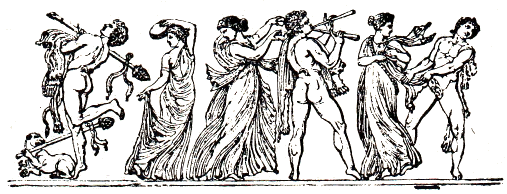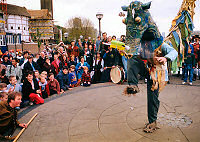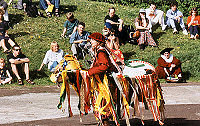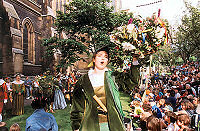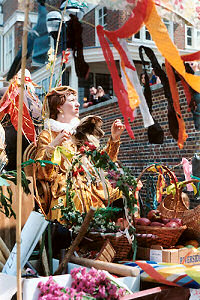May Games
 The Green Man encourages children in a Tug of War.
The Green Man encourages children in a Tug of War.
May Games is one of our three theatre-based seasonal celebrations held in Southwark, London. Currently we are seaking funding in order to repeat this event. If you are interested please contact us at .
Bringing in the May
... ther was a May-game ... with a gyant, and drumes ... with spechys, and a goodly pageant with a qoen ... and dyvers odur, with spechys: and then Sant George and the dragon ... (diarist Henry Machyn, 1554)
The plays, customs and age-old folklore that make up May Games are all rooted in time-honoured Maytime festivities. The welcoming of Spring, the joy at the return of 'the green', these activities go far back in history, and we are reviving them for the same reasons of celebration: to welcome the returning splendour of the sun... a gratulation of the spring. The late 20th century is struggling to sustain a sense of the natural world within its urban enclaves. The re-introduction of celebrations of the seasons on the urban streets where they were enjoyed before, is a way to connect again with nature.
... In the merriest Moneth of the yeare... Lords went a maying and the womb of the spring being great with child of pleasure... so the Hobbe horse, so the Maid Marian attired in colours... for morres dansse... after Robyn Hode and lytyll John and Maid marian and the frere Tuck and they had speches round about the town... (May-games 1559)
Robin Hood is our protagonist. He leads the 'dance' of the May games in combat-and-reconciliation plays, with the wild folk figure of the Jack-in-the-Green garland. Records of these plays go back as far as the 14th century. The plays we perform are texts based on extant material from the 1470s, with a fresh helping of later verse. Other characters are equally traditional: the Lady of May (Mary, Magdelene, Marian...), the Dragon (ours is a Thames Dragon), the Hobby Horse, the Maypole and the much-loved followers of Robin Hood.
16th Century May Games
Philip Stubbes was a puritan writer of this time, strictly behaved and disapproving of the pagan element of May celebrations. Fortunately for us, he described everything he disapproved of in 1583:
... [they] decke themselves with scarves, Ribons, Laces and all over with golde Rynges, precious stones, jewells, twentie or fourtie belles with riche hand kercheefes in their handes... Hobbie Horses, Dragons, and other Antiquities... bawdie pipes, thundering Drommes... [maypole] covered all over with Flowres and Hearbes bounde round about wyth strynes from the top to the bottom...
William Shakespeare mentions Robin Hood in As You Like It
and many merry men with him; and there they live like old Robin Hood of England. They say many young men flock to him every day, and fleet the time carelessly, as they did in the golden world.
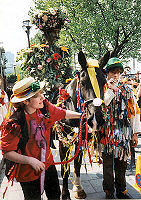
The Green Man arrives on a real horse.
Thomas Nashe, a playwright from the same time as Shakespeare, describes the man who played Maid Marian in 1592:
Martin himself is the Maid marian, trimly dressed up in a cast gown and a kercher of Dame Lawson's, his face handsomely muffled with a diaper-napkin to cover his beard and a great nosegay in his hand...
May poems exist right back into the thirteenth century - here is the beginning of a poem by Lydgate the Poet, who was a monk of Bury:
Mighty Flora, godess of finest flowers
Which clothed hath the soyle in lustie green
maide buds to spring and her sweete showers
By influence of the Sunne shine
Robin Hood Plays 500 years ago
Church records show that money was spent putting on Robin Hood plays in Kingston-upon-Thames, just south-west of London, with the expenses listed in the Churchwarden's Account Book of 1506 and 1509. Here are some excerpts:
Item for painting of a banner for Robin Hood
Perhaps the banner was used in a procession before the play.3d. Item for four pleats and a quarter of lawn for two morris garments 2s 11d. Item for arsedine for the same
Lawn is fine linen cloth, and arsedine is tinsel. The Morris Dancers had to be fancy!10d. Item for a gown for the lady
Being played by a man, the lady couldn't use a gown of her own ...8d. Item to the Official upon the Fair day for the Bishop's duty
Nowadays we have to talk to the Parks Authority and the Police. In 1506, they probably had to have the Bishop's permission to perform, and pay this fee.19s 6d. Item to the taborer
Item for a luter
Was the lutenist only the taborer's assistant, being paid so much less?6s 8d.
2s 0d.Item paid to John Edmund for the loans the coats of Robin Hood & Little John & Giles Kempe
Theatre companies still borrow costumes from each other, sometimes for money.17s 4d. Item paid for 2 pair of gloves for Robin Hood and Maid Marian 4 1/2d. Item paid for meat and drink for Robin Hood and his company
The most important part for the players!2s 2d.
Nuts in May
This old music game is not about nuts at all, but knots, meaning little bunches of flowers or greenery which people would gather together for Maytime decorations. The Tug of War is a traditional Maytime game, and this is a musical version.
All: First group: |
First group: Second group: |
| Second group: We'll have (Ellie) to pull him away, Pull him away, pull him away, We'll have (Ellie) to pull him away, On a cold and frosty morning. |
|
